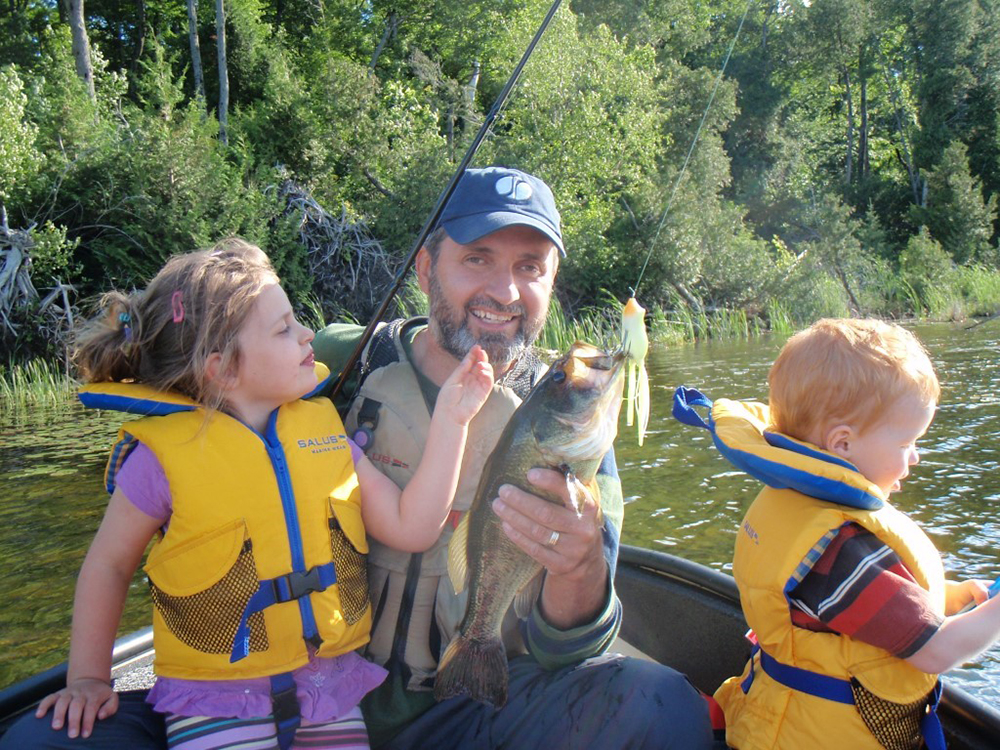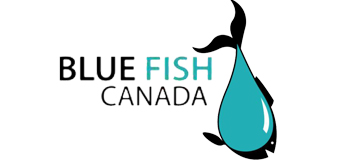Blue Fish News – June 28, 2020
In this June 28 2020 issue of the Blue Fish Canada News we celebrate the up-coming Family Fishing Week – July 4-12! This week’s news includes curated Blue Fish Radio content to get those new to fishing connected with anglers from across Canada; links to the latest fish, fishing and water quality news; and, a Blue Fish Canada pan fishing resource to ensure you and your family get the most out of the up-coming Family Fishing Week.
**Last chance to take the Blue fish Steward 12-question Quiz and enter your name to win one of seven great prizes totaling $750 in value**

Virtual fishing networks connect anglers across Canada, while groups seek to ensure the survival of native fish species:
Canadian Fishing Network nearing 11,000 strong – Blue Fish Radio
If you’re looking for a new fishing buddy or information about fishing in your area, you may want to consider following the Canadian Fishing Network on Facebook. Scottie Martin is the host and driving force behind the wildly successful CFN, which now has close to 11,000 followers on Facebook. They also just concluded another successful edition of the national fishing “Fish-Off” tournament led by CFN Michael Consul. The virtual fishing platform shows no signs of slowing, and is truly a grass-roots Phenomenon. Scottie and Mike were the guests on this episode of Blue Fish Radio.
Alberta Focusses on Rebuilding Native Trout Species – Blue Fish Radio
Five Alberta conservation groups and the Alberta government are working hard to rebuild native trout populations. Westslope Cutthroat Trout, bull trout and Athabasca rainbow trout are native trout species found in Alberta that now need help. Protecting these native species and the diversity they represent is crucial if we are to ensure the wide variety of fish and fishing opportunities across Alberta and Canada. The Alberta Native Trout Restoration Program includes The Cows and Fish, Trout Unlimited Canada, Foothills Research Institute, Canadian Parks and Wilderness Society and the Alberta Government. The Program entails: fish habitat improvements, a north Central Native Trout Recovery Program, a roadway Watercourse Crossing Remediation Initiative, a Westslope Cutthroat Trout Recovery Program, and a Whirling Disease detection, education and mitigation strategy. Listen as editor Lawrence Gunther speaks with senior ACA biologist Mike Rodtka as they discuss the many challenges ahead on Blue Fish Radio.
The Latest Fishing, Fish Health and Water Quality News
Fishing:
DFO’s Response to Fraser Chinook Salmon Conservation – Seafood Source
The DFO’s Fraser River Chinook salmon management measures announced June 20, 2020 are assessed by conservation groups as failing to protect endangered salmon runs. Others report that Fraser River Chinook stocks will continue to be tightly controlled, including limited harvests and a push-back on dates of certain fisheries. Specifically, a maximum size limit of 80 centimetres in southern marine recreational fisheries will be enforced for July and August, as well as a fishing closure at the mouth of the Fraser River. Limited harvest for First Nations will be allowed, and the commercial troll fishery will be pushed back into August to avoid Fraser chinook encounters.
Covid-19 Hits Florida Recreational Fishing Hard – Angling International
Florida is one of the US states hardest hit by COVID-19. Florida, often referred to as the ‘fishing capital of the world’, has more than four million anglers who generate $11.5 billion in economic impact and support more than 106,000 jobs.
The Golden Age of Smallmouth Bass – The IGFA
Smallmouth bass thrive in clear water. So, their tide began to turn after the Clean Water Act limited pollution of the Great Lakes and other waters, while clearing it as well. Further water clarification has been provided by exotic zebra and quagga mussels that crossed the Atlantic from Europe and colonized the Great Lake in the 1980s. Their populations have expanded to more lakes ever since, causing problems with shoreline infrastructure but providing water clarity for smallmouths to thrive. Invasive prey fish, such as the round goby, have also provided added forage for smallmouth bass. In their northern natural range, annual ice cover has been reduced in recent decades due to milder and shorter winters, which gives this warm water fish more time to spawn and grow.
American Sportfishing Association applauds passing of Great American Outdoors Act – Angling International
The body that represents the fishing tackle industry in the USA has applauded the passing of an historic public lands bill. By a comfortable majority, the US Senate gave the go-ahead to the Great American Outdoors Act, a landmark legislative package to fund access to and the maintenance of the nation’s public lands.
Fish Health:
Report on the 2020 State of Wild Atlantic Salmon – Atlantic Salmon Federation
The ASF’s annual look at Atlantic salmon returns to North American rivers shows that the downward trend in abundance continues. Last year’s adult salmon returns to North America were among the lowest in a 49-year data series, continuing a downward trend that threatens the sustainability of the species. In recent decades, the human harvest of wild Atlantic salmon has been significantly reduced through a series of conservation measures, helping to stabilize some populations, but recovery has been inhibited. Wild Atlantic salmon are struggling to adapt to warming rivers, changing oceans, and pressure from human development.
Teck Mines Elk Valley B.C. Coal Mine Expansion Threatens Westslope Cutthroat Trout – The Narwhal
Teck Resources’ Castle Mountain is being described by the company as an expansion of an existing mine, and not a ‘new’ mine — but critics say the project’s significant environmental impact should make it subject to a rigorous federal assessment. Tech’s own scientists report that mining associated selenium contamination has contributed to a 93% reduction in Westslope Cutthroat, a problem for Alberta’s trout recovery program. The coal mine’s expansion is expected to increase selenium pollution entering the rivers that flow into Alberta and Montana, causing the U.S. Environmental Protection Agency to request clarification on how the scientific assessment was conducted.
300-million-year-old fish resembles a sturgeon but took a different evolutionary path – Science Daily
Sturgeon, a long-lived, bottom-dwelling fish, are often described as “living fossils,” because their form has remained relatively constant, despite hundreds of millions of years of evolution.
Size matters in sex life of Atlantic salmon – Science Daily
For Atlantic salmon, size matters when it comes to love. Larger males and females that may spend up to four years at sea produce many more babies, but they are exceedingly rare compared to younger fish.
Key monitoring of herring near Haida Gwaii cancelled due to coronavirus – The Narwhal
The federal government axed seasonal dive surveys of endangered pacific herring off the B.C. coast, where the species has suffered worrying declines in recent decades. Herring are a key food source for west coast salmon and their continued over-harvesting is undermining the recovery of certain Chinook stocks at risk.
Water Quality:
More regulatory changes introduced in wake of Mount Polley mine disaster – Vancouver Sun
One of the largest mining-dam failures in the world in the past 50 years, the Aug. 4, 2014, collapse of Imperial Metals’ gold mine dam in B.C. shook the industry and caused wide spread concern that aquatic life would be harmed, particularly salmon that use the Quesnel Lake system to spawn. If the legislation is passed under the minority NDP government, a new chief permitting officer position will be created, separate from the chief inspector of mines.
A Shipwreck’s Incalculable Toll on a Remote Reef – Hakai Magazine
After a fishing boat ran aground on a fragile atoll, the consequences for the ecosystem were alarming—and curious. How the toxins from the shipwreck altered the ecosystem of the coral reef and the fish that lived nearby presents a disturbing but fascinating story.
Tourism:
Alaska Airlifts ‘Into the Wild’ Bus Out of the Wild – Outside Online
In recent years, the bus once occupied by Christopher McCandless had attracted tourists from all over the world—a growing number of whom had to be rescued in their attempt to reach the remote location. McCandless occupied the bus, located outside the town of Healy near the boundary of Denali National Park, during the spring and summer of 1992. He died there in mid-August, and his story was made famous by Jon Krakauer—first in a now-classic Outside story, “Death of an Innocent,” and then in his bestselling 1996 book, Into the Wild.
Business:
Fishbrain reaps benefit of significant shift to digital sales – Angling International
The shift towards e-commerce has been accelerated by the COVID-19 pandemic, which has seen bricks-and-mortar retailers across the globe forced to shut up shop. One company that has experienced the benefit of the shift is Fishbrain, described as the world’s largest social network for anglers.
Blue Fish Canada Sustainable Panfish Fishing Tips:
- Panfish live under docs and boathouses, and near rocks, weeds or around sunken brush.
- Panfish eat worms, grubs, flies and small fish, and can be caught using small artificial baits and lures.
- Use 4-6 pound test fishing line, non-lead weights and jigs sized 1/8 ounce or smaller, or non-offset size 8-12 circle hooks.
- Check harvest regulations before you go fishing and report tagged fish to aid with fish research.
- Use of small needle nose pliers can help with removing hooks, as does pinching down hook barbs.
- Cut the line near the hook if swallowed as fish can pass most small hooks safely.
- Hold fish out of water no longer than 30 seconds and always keep fish wet to protect the slime coating.
- Keep one of each panfish species in a bucket of water for observation, and change water regularly release fish.
- Never discard old fishing line, hooks, weights, artificial baits and live minnows into the environment.
- Always release extra-large panfish as these are the primary breeders.
About us:
You can read current and back issues of Blue Fish Canada’s Newsletters by visiting: www.BlueFishCanada.ca
For more about Lawrence Gunther, North America’s only blind professional angler, conservationist, writer, blogger, podcaster, film maker and TV personality, visit: www.LawrenceGunther.com
Gunther founded the charity Blue Fish Canada in 2012 and launched the podcast Blue Fish Radio in 2013.
Please rate The Blue Fish Radio Show on Apple Podcast so others will learn of this unique Canadian resource by visiting: https://podcasts.apple.com/us/podcast/the-blue-fish-radio-show/id1090189487?uo=4
Should you have a podcast suggestion or resource you would like to share, please send us a message to: Admin@BlueFishCanada.ca
Blue Fish Canada is a federally incorporated registered Canadian charity. Please consider making a small monthly donation to off-set the costs of this Newsletter and our other Blue Fish Canada programs by visiting: https://bluefishcanada.ca/donations/
 Blue Fish Canada/Poisson Bleu Canada
Blue Fish Canada/Poisson Bleu Canada
